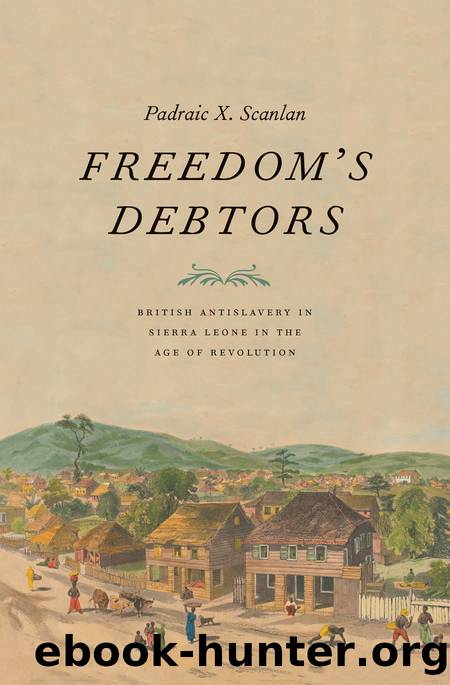Freedom's Debtors by Padraic X. Scanlan

Author:Padraic X. Scanlan
Language: eng
Format: epub
ISBN: 9780300217445
Publisher: Yale University Press
Charlie Maxwellâs War
Charles Maxwell understood that the Slave Trade Act had empowered military officers, giving them a source of recruits and a chance to line their pockets. Maxwell used the Act and the Vice-Admiralty Court to overawe Edward Columbine, expand the Royal African Corps, dominate the Freetown settlers, and transform the West India Regimentsâ recruiting station into an instrument for sending away surplus or otherwise undesirable âcaptured Negroes.â But his most dramatic campaign was a series of raids on slave forts along the coast north and south of the Freetown Peninsula. The 1811 Slave Trade Felony Act, designed to build on the Slave Trade Act, made slave trading by British subjects a crime punishable with transportation. Maxwell interpreted the Felony Act as a charter not only to pursue ships at sea, but also to hunt down and capture slave traders on shore, and to claim their forts as British territory. Maxwell believed that this would retroactively make even non-British slave traders subject to the Felony Act, making illegal raids into legal raids ex post facto. Maxwellâs raids show the wartime military and financial logic of the Slave Trade Act legislation at its most aggressive. They also represent a critical but overlooked moment in British imperial history, a moment when the campaign against the slave trade tipped from being a campaign of national self-purification conducted at sea, and became a justification for expansionist imperial war on land.
In 1810 Henry Brougham, eventually Lord Chancellor, was a young Scottish barrister and a client of the Clapham Sect. In Parliament he argued forcefully for the need for more coercive measures to enforce the abolition of the slave trade. âI must protest loudly against the abuse of language,â he proclaimed, âwhich allows [slave traders] to call themselves traders or merchants.â He rhapsodized that he would not allow trade to be âprostitutedâ by slave dealers when instead it should âhumanize and pacify the world.â124 Under the 1807 Act, the penalties for slave trading were economic: a captured slave trader lost his ship and his goods, and was fined. In 1811, Brougham pushed a law through Parliament that made it a felony for âany British subject, or any person residing in the United Kingdom, or any island, colony, dominion, fort, settlement, factory, belonging thereto or being in his Majestyâs occupation theretoâ to sell slaves.125
Under the Felony Act, slave trading would be punished with transportation for 14 years. The Felony Act also gave colonial officials the right to buy captured slave ships at auction, fit them with new gear and weapons, and commission them for the purpose of prosecuting the abolition of the slave trade.126 When Charles Maxwell governed Senegal, he had commissioned the George in exactly the same way for exactly the same purpose. Now the Felony Act seemed to Maxwell to have enshrined his improvisations in statute. Like the Slave Trade Act itself, the Felony Act provided a legal framework for antislavery that was not always clearly understood, and often very flexibly interpreted by colonial jurists and officials.
Download
This site does not store any files on its server. We only index and link to content provided by other sites. Please contact the content providers to delete copyright contents if any and email us, we'll remove relevant links or contents immediately.
| Africa | Americas |
| Arctic & Antarctica | Asia |
| Australia & Oceania | Europe |
| Middle East | Russia |
| United States | World |
| Ancient Civilizations | Military |
| Historical Study & Educational Resources |
The Dawn of Everything by David Graeber & David Wengrow(1697)
The Bomber Mafia by Malcolm Gladwell(1620)
Facing the Mountain by Daniel James Brown(1546)
Submerged Prehistory by Benjamin Jonathan; & Clive Bonsall & Catriona Pickard & Anders Fischer(1452)
Wandering in Strange Lands by Morgan Jerkins(1419)
Tip Top by Bill James(1409)
Driving While Brown: Sheriff Joe Arpaio Versus the Latino Resistance by Terry Greene Sterling & Jude Joffe-Block(1370)
Red Roulette : An Insider's Story of Wealth, Power, Corruption, and Vengeance in Today's China (9781982156176) by Shum Desmond(1353)
Evil Geniuses: The Unmaking of America: A Recent History by Kurt Andersen(1346)
The Way of Fire and Ice: The Living Tradition of Norse Paganism by Ryan Smith(1329)
American Kompromat by Craig Unger(1307)
It Was All a Lie by Stuart Stevens;(1296)
F*cking History by The Captain(1294)
American Dreams by Unknown(1277)
Treasure Islands: Tax Havens and the Men who Stole the World by Nicholas Shaxson(1267)
Evil Geniuses by Kurt Andersen(1250)
White House Inc. by Dan Alexander(1207)
The First Conspiracy by Brad Meltzer & Josh Mensch(1167)
The Fifteen Biggest Lies about the Economy: And Everything Else the Right Doesn't Want You to Know about Taxes, Jobs, and Corporate America by Joshua Holland(1117)
